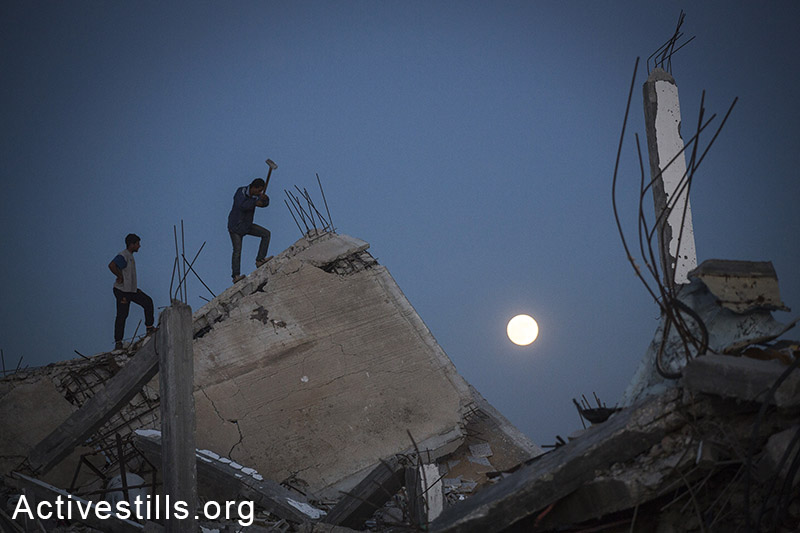This week’s air strikes allowed Defense Minister Liberman to demonstrate to the Israeli public that not even the smallest violation of the ceasefire between Israel and Hamas will be tolerated.

The Israeli air raids on Gaza overnight Sunday were the largest in scope and impact since the 2014 war. This was enough to set tongues wagging about the imminence of another full-blown war — an event that has punctuated Israel’s blockade of Gaza with depressing regularity, every two or three years since 2006. Yet it was clear almost immediately that the strikes were not of the kind intended to shore up an escalation.
True, they were disproportionate even by Israeli standards: scores of state-of-the-art missiles were lobbed at 50 targets in response to one rocket fired from Gaza at the Israeli city of Sderot by a Salafi group. But the entire escalation ended without fatalities on either side, and with only a few people in Gaza wounded. Moreover, instead of targeting installations held by the Salafis (if they hold any sizable installations at all), the majority of the strikes were aimed at empty government buildings and unmanned structures belonging to Hamas — which is to say, the very nemesis of the group that launched that rocket to begin with.
The real purpose of the strikes, then, seems to have been much closer to home — to impress upon the Israeli public that now that the perennial hardliner Avigdor Liberman is the head of the Ministry of Defense, not even the smallest violation of the ceasefire between Israel and Hamas will be tolerated.
This does not mean that Liberman is interested in an escalation. The IDF is dead set against escalating at this point, and so, it seems, is most of Netanyahu’s cabinet and the prime minister himself.
More importantly for Liberman, if he begins putting his money where his mouth had been all these years, he has nothing left to sell to the Israeli public in his final bid to succeed Netanyahu as prime minister. These kinds of air strikes allow him to demonstrate that he is tougher than the rest of the cabinet combined, and still hint that his hands are tied by cautious and overly pragmatic prime minister.

The air raids, of course, come in the context of a decade of carefully engineered and maintained humanitarian calamity, and much more than a decade of punishing bombardments, shelling and invasions; the horror that even sonic booms, much less airstrikes, inflict on Gaza’s relentlessly traumatized population cannot be overestimated.
Still the fact that 50 targets were hit with zero fatalities testifies to a considerable effort by the IDF to make as much noise as it could while avoiding another all-out war (Gaza is so densely packed that it’s much easier to hit someone than to miss). It also testifies to a considerable degree of luck. If one of the buildings hit in the raids collapsed on a nearby family home, or if shrapnel from the bombs had hit a hospital, there would be much more pressure on paramilitaries in Gaza to respond, which would result in Liberman escalating some more, and so on and so forth, until we were, indeed, right back in 2014 (or 2012, or 2009).
There are risks for Liberman in such a situation — if the war goes horribly wrong for Israel, he will almost certainly have to take the blame. There is also a potential for gain: in the event of an all-out war in Gaza, Liberman will be the natural leader of the cabinet hawks that habitually nudge Netanyahu to go the whole nine yards and displace Hamas, consequences — including the rise of ISIS-like Salafi groups in its stead — be damned.
While Liberman may not even want to actually bring down Hamas, he is certainly going out of his way to show that he is more willing than either his predecessor or his prime minister to take a few steps in that direction. It will be surprising if the Salafi group that launched that solitary rocket on Sunday night fails to take notice of that peculiar constellation of interests between themselves and Israel’s new defense minister, and to do whatever they can to inflate Liberman’s contrived recklessness into the real deal.


